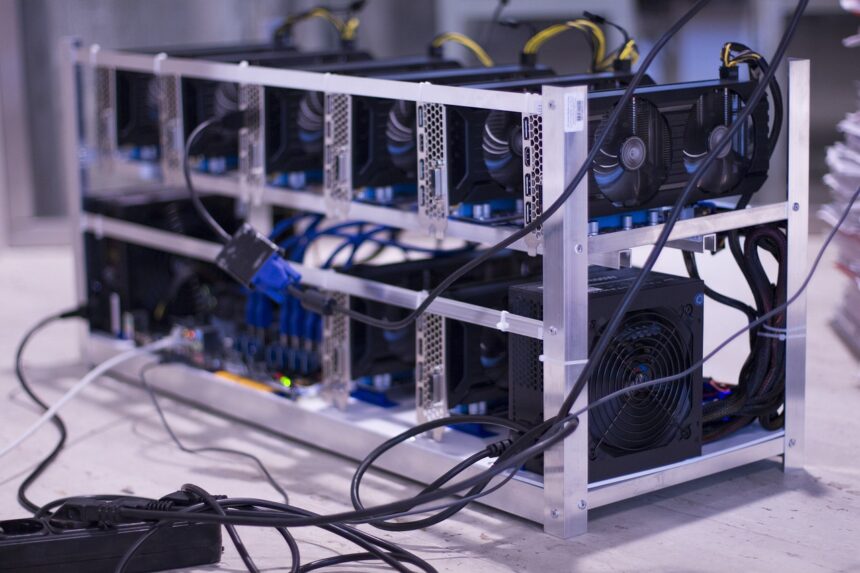Bitcoin mining is a process by which new Bitcoins are generated. It involves solving complex mathematical equations with computers in order to create a new block, which is added to the blockchain. Each time a block is added, new Bitcoins are created and miners are rewarded with a certain amount of those coins. The mining process is very complex and requires specialized hardware and software. Miners must use their computing power to solve the equations and, in turn, are rewarded with the newly created digital currency. The more powerful the miner’s computer is, the more likely they are to solve the equation and be rewarded with coins.
Benefits of Bitcoin mining
Bitcoin mining is a process that allows users to create their own digital currency. It is an effective way to earn money, as miners are rewarded with newly created Bitcoin when they successfully verify a new set of transactions. This process also helps to secure and maintain the integrity of the Bitcoin network, as miners are required to solve complex mathematical problems to verify the transactions. Furthermore, mining provides a means of decentralizing the Bitcoin network, which helps to ensure it remains secure and reliable. Ultimately, mining is a great way to make money, as well as helping to keep the Bitcoin network running smoothly and safely.
Different types of Bitcoin miners
Bitcoin miners are crucial for keeping the Bitcoin network secure and operational. They are responsible for verifying transactions and creating new blocks of data on the blockchain. There are several different types of Bitcoin miners available, each with its own advantages and disadvantages. ASIC miners are the most powerful and efficient option but require a significant investment. GPU miners are more affordable and can be used for mining a variety of different altcoins. CPU miners are the least powerful and most affordable option, but are suitable for hobby miners. Cloud mining is another option that allows users to rent mining hardware from a third-party provider.
What hardware is required for Bitcoin mining
In order to mine Bitcoin, one requires specific hardware. This hardware typically consists of an application-specific integrated circuit (ASIC) miner. ASIC miners are specially-designed machines that can process the complex mathematical equations required for Bitcoin mining. Additionally, a computer running a Bitcoin mining program and a reliable internet connection is also necessary. In order to ensure that the mining process is as efficient as possible, it is important to have a high-powered computer with a good graphics card. Lastly, a Bitcoin wallet is also required in order to store the mined coins.
How to set up a Bitcoin mining operation
Setting up a Bitcoin mining operation involves several steps. First, you need to purchase the necessary hardware to mine Bitcoin. This includes an ASIC miners, a power supply, and a cooling system. Additionally, you need to select a mining pool and a wallet to store your mined coins. Once you have the hardware and software ready, you can start configuring your mining software. You also need to ensure you have a reliable internet connection to ensure your mining operation is successful. Finally, you need to monitor your mining operation and make sure everything is running smoothly. With the right setup and hardware, you can begin mining and earning Bitcoin.
Potential risks associated with Bitcoin mining
Bitcoin mining can be a potentially risky endeavor due to the fact that it requires a significant amount of computing power and electricity to process transactions on the Bitcoin network. Additionally, the process of mining Bitcoin is highly competitive and can often result in financial loss if the market value of Bitcoin drops. Furthermore, the potential for fraud and malicious activities associated with Bitcoin mining can be risky, as miners may be exposed to malicious software, scams, and hacking attempts. Lastly, the environmental impact of Bitcoin mining can be significant, as it requires large amounts of energy and can contribute to global warming. As such, it is important to be aware of the potential risks associated with Bitcoin mining before engaging in the activity.
The profitability of Bitcoin mining
Bitcoin mining is becoming increasingly profitable as the value of Bitcoin rises. As more miners join the network, the competition for Bitcoin blocks increases and the rewards for successful miners increase as well. This makes it a great opportunity for investors to make a profit if they have the right equipment, electricity costs, and access to reliable pools. Additionally, the rise of specialized ASIC miners has made it easier for miners to scale their operations quickly, improving the chances of success and further increasing profits. With the right setup, Bitcoin mining can be a lucrative venture.
The environmental impact of Bitcoin mining
The environmental impact of Bitcoin mining is a concerning issue as it requires large amounts of energy to power the computers used in the mining process. This energy usage has the potential to cause a large carbon footprint, as the mining process often involves electricity generated from burning fossil fuels. In addition, the mining process can also produce large amounts of heat, which can cause local air pollution and damage to nearby ecosystems. As Bitcoin mining grows in popularity, it is important to consider the environmental impact of this activity and take steps to reduce its impact on the environment.
What is proof-of-work (PoW) blockchain
Proof-of-work (PoW) blockchain is a type of distributed ledger technology that uses a consensus algorithm to achieve distributed agreement on the state of the blockchain. This consensus algorithm requires participants to prove that they have performed a certain amount of computational work in order to add a new block to the chain. This work is known as “proof of work”, and it is the main security feature of the blockchain. It is also used to prevent double-spending, as well as to create incentives for participants to maintain the integrity of the blockchain. PoW blockchain is used by many of the major cryptocurrencies such as Bitcoin, Litecoin, and Ethereum.
The 5 pros of proof-of-work:
- Offers a secure and reliable way to verify and validate transactions
- Provides distributed consensus and prevents double-spending
- Makes Sybil attacks harder to execute
- Rewards miners for their work, incentivizing the network
- Can be scaled up to increase security and performance
The 5 cons of proof-of-work:
- It can be expensive to run the necessary hardware and software to mine.
- It is vulnerable to concentration of power in the hands of miners with the most computing power.
- It can lead to centralization of mining power and the potential for manipulation of the network.
- It can be slow and inefficient in verifying transactions.
- It has a large environmental cost due to the energy required.
bitcoin mining
A laptop with a glowing screen displaying a graph of Bitcoin prices. The laptop is connected to a mining rig with multiple GPUs, which is emitting a faint hum. On the desk is a pile of coins and a stack of paper showing calculations and notes.











